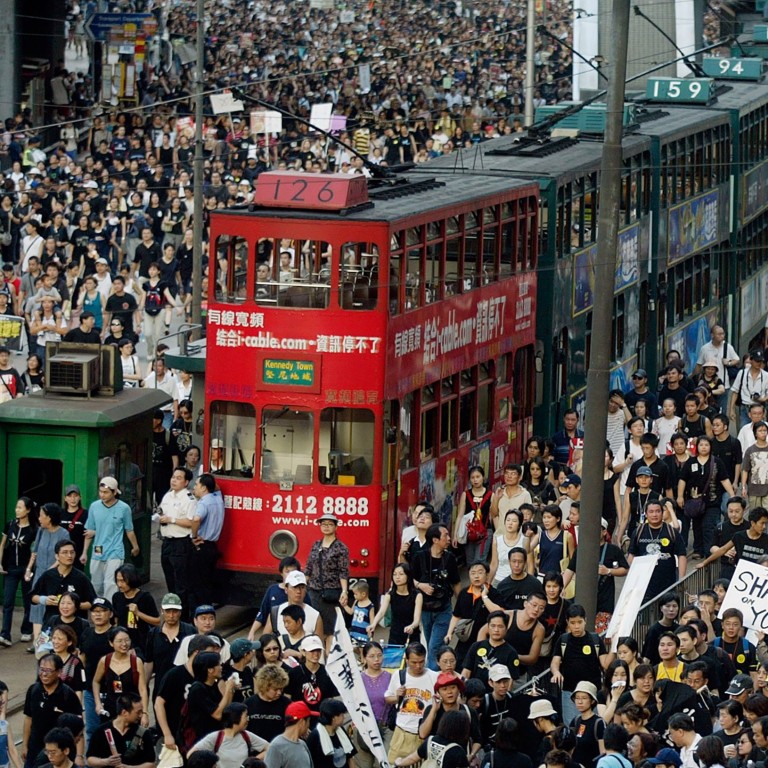But all may not be lost for proponents of the China model as they attempt to apply their ideas to Hong Kong. This is especially if they look at the
Hu Jintao administration’s response to the (also massive)
Article 23 protests in 2003, a reaction different from Beijing’s reaction to the extradition bill crisis. The net effect of this different reaction was that, after the 2003 demonstrations, Hong Kong rapidly returned to stability.
Mass demonstrations came to an end. Violence became relatively non-existent. Life returned to normal. And favourable local opinion of the central government’s handling of “one country, two systems” surged to nearly 60 per cent, its highest since the 1997 handover.
After the failure to pass Article 23 legislation, Beijing set up a committee to formulate its policies for Hong Kong (led by Jiang Zemin’s protégé Zeng Qinghong) as a first step. Zeng’s committee bypassed central government agencies responsible for collecting intelligence on Hong Kong, and instead directly consulted local elites and dispatched researchers from Beijing to ascertain public opinion.
This is unlike Beijing’s current reliance on hardline opinion to make
military threats, which has resulted in a further loss of popular legitimacy, continued protests, and outcomes that are no doubt embarrassing for the central government, with
1.7 million demonstrators taking to the streets on August 18 — even as Xinhua distributed mock videos showing Chinese troops shooting demonstrators.
Fear over the loss of autonomy caused the crisis. Doubling down on autonomy-usurping policies through military intervention – as well as Chief Executive Carrie Lam Cheng Yuet-ngor’s recent
veiled threats on the use of emergency powers – reinforces the worst fears about the mainland’s system as a brutal regime bent on wrecking “
one country, two systems”.
If Chinese troops were
deployed and then injured or even killed protesters, the consequent disaster would not be limited to the city. It could unleash a financial, political and security cataclysm for the mainland. Such self-destructive threats consequently fan the flames of anger, fear, instability and more protests.
In the Article 23 crisis, step two was to hold local leaders accountable. Courageous legislators, such as the pro-business, pro-Beijing former Liberal Party chairman James Tien Pei-chun,
resigned from office rather than support the legislation. In the wake of the crisis, Regina Ip Lau Suk-yee also resigned as secretary for security.
In December 2004, then-president Hu publicly
dressed down Hong Kong’s then chief executive Tung Chee-hwa for a string of economic blunders. In March 2005, Tung
resigned with two years left of his five-year term. The lack of any resignations this time, amid what is perhaps Beijing’s worst crisis of legitimacy since 1989, is difficult to understand given China’s supposedly vaunted meritocracy.
It is also inconsistent with China’s own standard operating procedures, where under President Xi Jinping
more than 1 million Communist Party officials have been censured or purged for alleged
corruption and other misdeeds.
Step three, after July 2003, was to return to first principles by muting inflammatory statements against Hong Kong autonomy, instead, providing reassurances that the central government was still economically, politically and constitutionally serious about “one country, two systems”. After July 2003, China muted its discussion of national security issues in favour of messages emphasising stable relations, continued economic collaboration and further decentralisation.
For example, in a 2007 speech commemorating the 10th anniversary of the handover, then-president Hu mentioned “stability” 10 times and “economy” 20 times, but makes no direct reference to Article 23 issues. These efforts also unfolded amid increasing signs of decentralisation, in which directly appointed
Legislative Council seats were abolished and hope was in the air regarding executive branch universal suffrage.
Furthermore, after the events of July 2003, the central government implemented a range of policies that augmented Hong Kong’s economic capabilities, such as the
Closer Economic Partnership Arrangement, or CEPA, and in 2005, CEPA II.
As a result of these agreements, as of 2006, all tariffs were abolished for goods entering mainland China from Hong Kong. This helped Hong Kong to weather the 2008 global
recession, improved its flagging manufacturing sector, and resulted in increased numbers of mainland tourists.
The mainland also benefited from the arrangement through increased flows of Hong Kong investment, transfer of expertise in management and technology, and greater opportunities for Chinese firms to interact with the outside world.
As China struggles amid its
trade war with the United States and as the fate of its most important financial centre (Hong Kong)
hangs in the balance, Beijing should do more to embrace previously successful Chinese policies by turning away from threats, delivering accountability, restarting political reform, and providing more discernible constitutional and economic reassurance.
David A. Rezvani teaches Asian politics, international relations and writing at Dartmouth College and is the author of Surpassing the Sovereign State: The Wealth, Self-Rule, and Security Advantages of Partially Independent Territories


